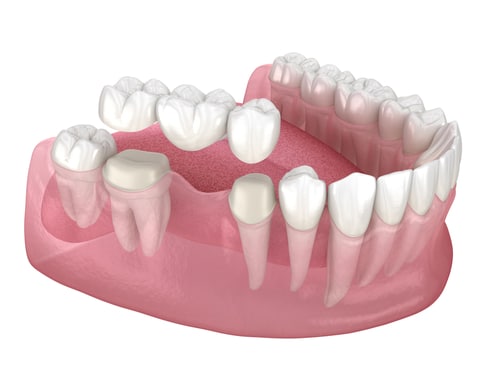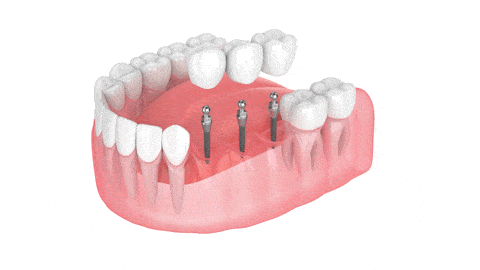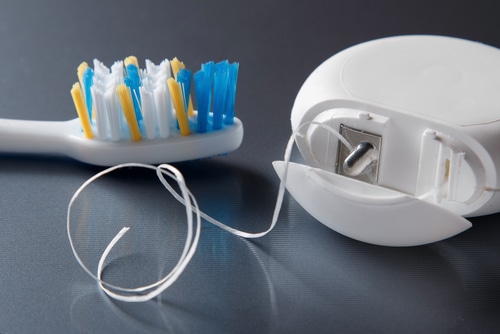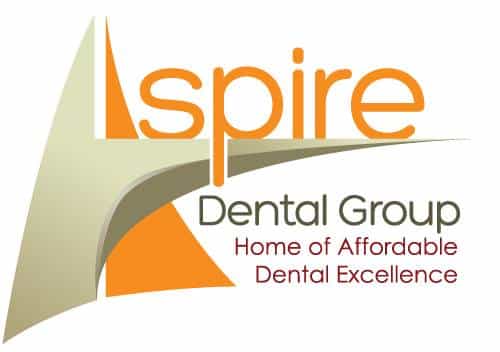Dental Bridges in Lake City, FL
It might surprise you to know that about 120 million people in the US are missing at least one permanent tooth. A missing tooth, or multiple missing teeth, can cause many problems. From jawbone loss to misalignment, losing a tooth will affect your smile and oral health. It’s important to replace missing teeth quickly, but stable and natural-looking solutions should also be a priority. One of the most effective methods to achieve these goals is by using dental bridges.
What Are Dental Bridges?
 Dental bridges are dental appliances that offer both cosmetic and restorative benefits: they make you look and feel better while restoring functionality. Simply put, bridges are devices that cover the space between two healthy teeth where one or more teeth are missing.
Dental bridges are dental appliances that offer both cosmetic and restorative benefits: they make you look and feel better while restoring functionality. Simply put, bridges are devices that cover the space between two healthy teeth where one or more teeth are missing.
Why Are Bridges Needed?
Bridges restore function after tooth loss. Replacing lost teeth quickly can help improve the following:
- Biting and chewing ability
- Speech clarity
- Teeth alignment
- Smile aesthetics
- Self-esteem
- Jawbone health
Types of Dental Bridges
The most common type of dental bridge is a traditional bridge. For this variety, two dental crowns sit on the surrounding healthy teeth, supporting an artificial tooth known as a “pontic” that fills the gap in between.
However, traditional bridges do not work in every situation. Other types of bridges address varying situations and needs.
- Cantilever bridges use only one crown to stabilize the bridge, like a balcony connecting to a building only on one side.
- Maryland bridges attach to the teeth not with crowns, but with metal wings bonded to the back of the surrounding teeth. They are generally used to replace front teeth, as they are not strong enough to handle the chewing power needed further back.
- Implant-supported bridges are similar to traditional bridges but connect to dental implants rather than crowns. These are the most stable options and offer additional benefits thanks to the innovation of mini dental implants.
At Aspire Dental Group, we specialize in implant-supported bridges that leverage the benefits of mini dental implants. They offer numerous advantages over other options and have remarkably high rates of success and patient satisfaction.
Benefits of Implant-Supported Bridges
Implant-supported dental bridges combine the concept of bridges with the benefits of dental implants. This combination gives you the best of both approaches. For example, implant bridges help support jawbone health. Since dental implants act as artificial tooth roots, they stimulate the jaw to prevent further bone and tissue loss. And because the implant connects directly to the jawbone, it fills the gap in a more stable way, preventing remaining teeth from shifting or becoming misaligned.
Getting implant bridges doesn’t affect any of your remaining teeth. With traditional bridges, the enamel on your teeth must be shaved down to accommodate the crowns. No tooth alteration is necessary with implants. Additionally, because of their stability, implant-supported bridges allow us to simultaneously replace any number of consecutively missing teeth.
 Dr. Harvey and Dr. McNair are experts in the placement of mini dental implants. These small alternatives to large standard implants offer additional advantages:
Dr. Harvey and Dr. McNair are experts in the placement of mini dental implants. These small alternatives to large standard implants offer additional advantages:
- Smaller size: Mini implants are half the width of their traditional counterparts, which makes them an option for tight spaces and patients with less jawbone density.
- Streamlined placement procedure: Traditional implants can take multiple visits and months to finish if a bone graft is necessary. We can often place mini implants in a single visit.
- Faster recovery: Because of their less invasive placement procedure, most patients recover from getting mini implants within 24-48 hours.
- Better durability: The single-piece titanium design of mini implants is incredibly strong and resistant to bacteria buildup. Plus, it won’t budge. You won’t have to worry about shifting or moving teeth.
- More cost-effective: The small size and less invasive placement all add up to a more affordable option than traditional implants.
The Process for Dental Bridges
Filling the gap in your smile starts with contacting Aspire Dental Group to schedule a consultation to determine your candidacy. To be a good candidate for implant-supported bridges, you must be in good health and have enough jawbone density remaining in the treatment area to support the implant. At your consultation, you’ll meet with Dr. Harvey or Dr. McNair, have an oral examination completed, and get X-rays taken of your mouth. We’ll also discuss your treatment options and go over financial information to select a path forward that’s right for you.
On the day of the procedure, you will receive a local anesthetic to numb your gums and jaw. A small hole will be drilled into your gums and jawbone, and the mini implant will be securely screwed into place. Because mini implants are so small, they do not require the same healing process as traditional implants. In most cases, the bridge can be connected to the implants immediately, instantly revitalizing your smile.
Recovery and Aftercare
 The recovery process for an implant-supported bridge is quick, but we do ask that you be careful eating certain foods. Avoid extremely hard or sticky foods for a few days while the implants settle. You can brush and floss normally, but take care around the implant sites. Any pain or discomfort can be managed with a cold compress or over-the-counter medication.
The recovery process for an implant-supported bridge is quick, but we do ask that you be careful eating certain foods. Avoid extremely hard or sticky foods for a few days while the implants settle. You can brush and floss normally, but take care around the implant sites. Any pain or discomfort can be managed with a cold compress or over-the-counter medication.
Implant-supported bridges can last for many years if properly cared for. Be sure to establish a thorough oral hygiene routine that involves brushing twice and flossing daily. While there are no food restrictions once the implants integrate with the jawbone, we recommend curbing certain habits to safeguard your oral health. Biting your nails, chewing ice, opening packages with your mouth, or grinding your teeth can all affect your implants and natural teeth. If you’re a nighttime tooth grinder, speak to us about a mouth guard to avoid excessive pressure on your teeth.
Regular appointments with us at Aspire Dental Group will help us monitor any problems that might arise and address them before they become a larger issue. With proper care and maintenance, your implant-supported bridges can last for years and years.
Learn More About Dental Bridges at Aspire Dental Group
Whether you’re missing one tooth or several, replacing them with mini implant-supported bridges is a well-founded option backed by decades of research and success stories. With mini implants, you don’t need to worry about long, painful procedures that take months to recover from. Instead, we can restore your smile quickly thanks to the implant design and our efficient placement technique. These small innovations translate to big cost savings, exceptional results, and long-term tooth replacement.
Don’t wait any longer to get the dental help you need. Schedule an appointment with us at Aspire Dental Group and take the first step towards a stable, confident tooth replacement option.
